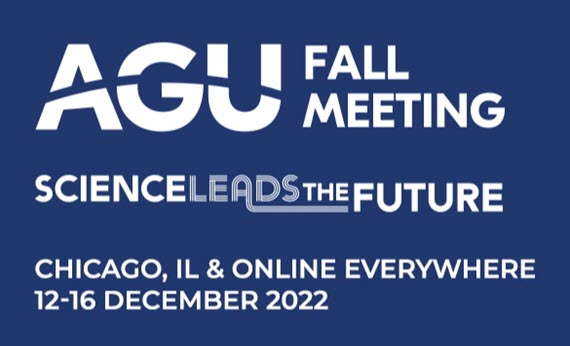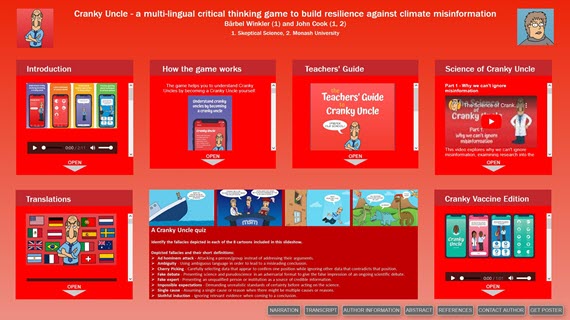AGU Fall Meeting 2022 - Cranky Uncle makes an appearance
Posted on 5 December 2022 by BaerbelW
This year's Fall Meeting of the American Geophysical Union (AGU) takes place in Chicago as well as online from December 12 to 16. Thanks to being held in hybrid mode it was feasible for John Cook and me to submit an abstract to one of the sessions. Just like for the European Geosciences Union's (EGU) meeting earlier this year, we decided to hghlight the Cranky Uncle game.
ED11A - Climate Empowerment: Climate Education Initiatives II Online Poster Discussion is being convened by Gina Fiorile, Kathryn Boyd, Anne Gold and Frank Niepold and will happen on Monday, Dec. 12, 2022 from 8a to 9a CST. The abstract for the session looked like a good fit to present the Cranky Uncle game:
Reducing vulnerability to climate and preparing for just transitions to a low-carbon economy are critical for societies across the world, particularly in frontline communities. Coordinated systems of education, communication, and outreach can support learning to enhance the adaptability of our cities and create stronger communities, empowering people to address climate change. Improving learning about Earth's complex climate and energy system is fundamental to support development of mitigation and adaptation strategies. The CLEAN Network is committed to improving climate and energy education locally, regionally, nationally, and globally and brings together a professionally diverse community of over 800 members and programs. This session provides opportunities for CLEAN network partners to showcase their work and share information, models, and new program designs in order to support session participants in taking action within their own communities and organizations. We also invite abstracts from other climate-centered learning programs, projects, initiatives, and efforts.
The session at AGU has been designated as an "online poster discussion" which means that each included abstract will have an interactive "iPoster" and a 10-minute timeslot allocated to talk about it. You can check out the iPoster yourself here (please note that AGU Fall Meeting login might be required), or by clicking on the poster's screenshot for a "mock up" PDF-version (3.6MB):
A larger version of the image is available here and you can also download an interactive ppsx-version including the audio-files (18MB).
The nice thing about the iPoster format is, that you can include as much text as you like, links to online resources, images, animations, videos and audio. So, there's a lot to click on, read through, watch and listen to. Give it a try!
Here is our abstract for the session:
Inoculation theory provides a framework for responding to misinformation about climate change. This involves explaining the misleading rhetorical techniques and logical fallacies used to mislead. Inoculation has been found to be effective in neutralizing misinformation casting doubt on the scientific consensus on human-caused global warming. However, there are many misinformation techniques and inoculating people against them all is a communication and education challenge. Games offer engaging tools for incentivizing people to repeatedly perform misinformation-spotting tasks in order to build up their critical thinking skills. Games that are fun to engage with while serving a useful educational purpose are known as serious games, and are already being explored as a tool for building resilience against misinformation, using an approach known as active inoculation. Typically, inoculation interventions are passive, with messages received in a one-way direction from communicator to audience. In contrast, active inoculation involves participants in an interactive inoculation process – having them learn the techniques of science denial by ironically learning to use the misleading techniques themselves. The Cranky Uncle game adopts an active inoculation approach, where a “cranky uncle” cartoon character mentors players to learn the techniques of science denial. Cranky Uncle is a free game available on iPhone (sks.to/crankyiphone) and Android (sks.to/crankyandroid) smartphones as well as web browsers (sks.to/crankybrowser). The player’s aim is to become a “cranky uncle” who skillfully applies a variety of logically flawed argumentation techniques to reject the conclusions of scientific communities. By adopting the mindset of a cranky uncle, the player develops a deeper understanding of science denial techniques, thus acquiring the knowledge to resist misleading persuasion attempts in the future.
I'm looking forward to the session and am happy that it'll take place during my afternoon and not the middle of my night as happened in 2020! It'll be one of the very first sessions of the week, so fingers crossed that the organizers thoroughly tested the hybrid system ahead of time! For the remainder of the week I don't have any sessions I "need" to be in but I plan to sample several others related to science education and communication. Here is a list of a few I think are of interest for me (but not all of them have an online component):
Monday, Dec 12
- ED12A New and Innovative Methods for Educating the Public on Earth and Space Science Topics I Oral
- ED13A Climate Empowerment: Effective Strategies to Advance Climate and Resilience Education in K-12 and Informal Learning Contexts I Oral
- ED14A Climate Empowerment: Effective Strategies to Advance Climate and Resilience Education in K-12 and Informal Learning Contexts II Online Poster Discussion
- ED15A Education Research in the Earth and Space Sciences: Theoretical Foundations, Methods, and Results II Oral
- ED15C Climate Empowerment: Climate Education Initiatives III Poster
- ED15D Climate Empowerment: Effective Strategies to Advance Climate and Resilience Education in K-12 and Informal Learning Contexts III Poster
Tuesday, Dec 13
- ED21A Education Section General Contributions Poster Session I Online Poster Discussion
- ED23A Climate Empowerment: Exploring Professional Development Innovations to Engage Educators and the Future Workforce in Climate Solutions I Oral
- ED25B Climate Empowerment: Exploring Professional Development Innovations to Engage Educators and the Future Workforce in Climate Solutions II Poster
Wednesday, Dec 14
Thursday, Dec 15
Friday, Dec 16































 Arguments
Arguments
































Comments